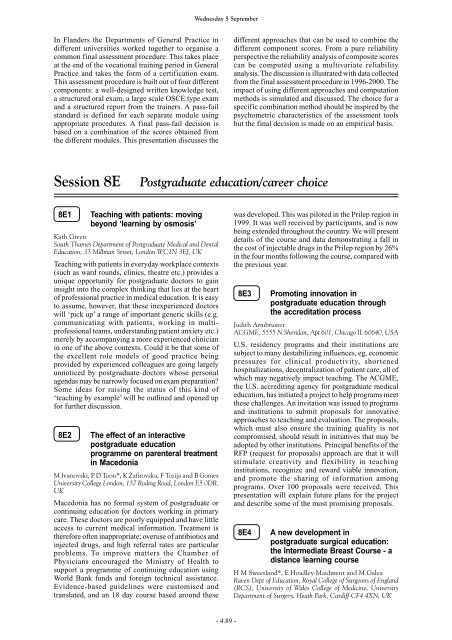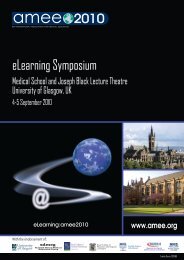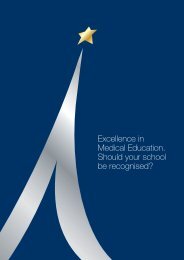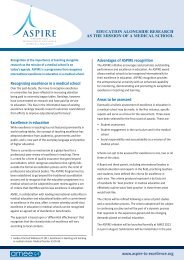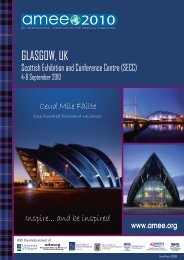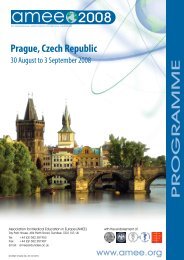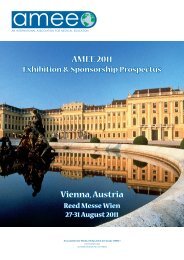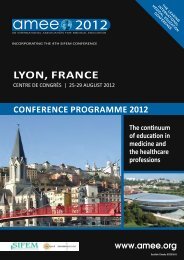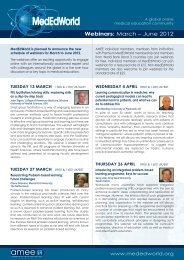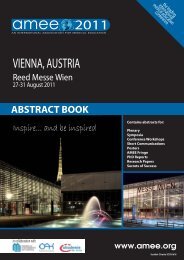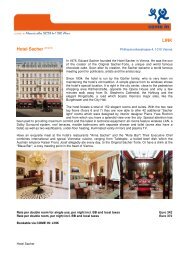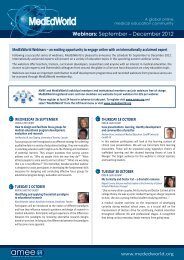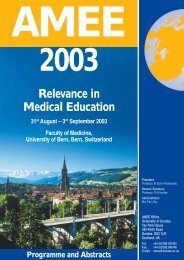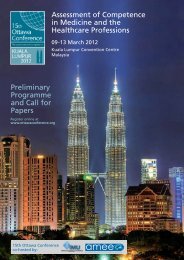AMEE Berlin 2002 Programme
AMEE Berlin 2002 Programme
AMEE Berlin 2002 Programme
You also want an ePaper? Increase the reach of your titles
YUMPU automatically turns print PDFs into web optimized ePapers that Google loves.
In Flanders the Departments of General Practice in<br />
different universities worked together to organise a<br />
common final assessment procedure. This takes place<br />
at the end of the vocational training period in General<br />
Practice and takes the form of a certification exam.<br />
This assessment procedure is built out of four different<br />
components: a well-designed written knowledge test,<br />
a structured oral exam, a large scale OSCE type exam<br />
and a structured report from the trainers. A pass-fail<br />
standard is defined for each separate module using<br />
appropriate procedures. A final pass-fail decision is<br />
based on a combination of the scores obtained from<br />
the different modules. This presentation discusses the<br />
Wednesday 5 September<br />
- 4.89 -<br />
different approaches that can be used to combine the<br />
different component scores. From a pure reliability<br />
perspective the reliability analysis of composite scores<br />
can be computed using a multivariate reliability<br />
analysis. The discussion is illustrated with data collected<br />
from the final assessment procedure in 1996-2000. The<br />
impact of using different approaches and computation<br />
methods is simulated and discussed. The choice for a<br />
specific combination method should be inspired by the<br />
psychometric characteristics of the assessment tools<br />
but the final decision is made on an empirical basis.<br />
Session 8E Postgraduate education/career choice<br />
8E1 Teaching with patients: moving<br />
beyond ‘learning by osmosis’<br />
Kath Green<br />
South Thames Department of Postgraduate Medical and Dental<br />
Education, 33 Millman Street, London WC1N 3EJ, UK<br />
Teaching with patients in everyday workplace contexts<br />
(such as ward rounds, clinics, theatre etc.) provides a<br />
unique opportunity for postgraduate doctors to gain<br />
insight into the complex thinking that lies at the heart<br />
of professional practice in medical education. It is easy<br />
to assume, however, that these inexperienced doctors<br />
will ‘pick up’ a range of important generic skills (e.g.<br />
communicating with patients, working in multiprofessional<br />
teams, understanding patient anxiety etc.)<br />
merely by accompanying a more experienced clinician<br />
in one of the above contexts. Could it be that some of<br />
the excellent role models of good practice being<br />
provided by experienced colleagues are going largely<br />
unnoticed by postgraduate doctors whose personal<br />
agendas may be narrowly focused on exam preparation?<br />
Some ideas for raising the status of this kind of<br />
‘teaching by example’ will be outlined and opened up<br />
for further discussion.<br />
8E2 The effect of an interactive<br />
postgraduate education<br />
programme on parenteral treatment<br />
in Macedonia<br />
M Ivanovski, P D Toon*, K Zafirovska, F Tozija and B Gomes<br />
University College London, 137 Roding Road, London E5 0DR,<br />
UK<br />
Macedonia has no formal system of postgraduate or<br />
continuing education for doctors working in primary<br />
care. These doctors are poorly equipped and have little<br />
access to current medical information. Treatment is<br />
therefore often inappropriate; overuse of antibiotics and<br />
injected drugs, and high referral rates are particular<br />
problems. To improve matters the Chamber of<br />
Physicians encouraged the Ministry of Health to<br />
support a programme of continuing education using<br />
World Bank funds and foreign technical assistance.<br />
Evidence-based guidelines were customised and<br />
translated, and an 18 day course based around these<br />
was developed. This was piloted in the Prilep region in<br />
1999. It was well received by participants, and is now<br />
being extended throughout the country. We will present<br />
details of the course and data demonstrating a fall in<br />
the cost of injectable drugs in the Prilep region by 26%<br />
in the four months following the course, compared with<br />
the previous year.<br />
8E3 Promoting innovation in<br />
postgraduate education through<br />
the accreditation process<br />
Judith Armbruster<br />
ACGME, 5555 N Sheridan, Apt 601, Chicago IL 60640, USA<br />
U.S. residency programs and their institutions are<br />
subject to many destabilizing influences, eg, economic<br />
pressures for clinical productivity, shortened<br />
hospitalizations, decentralization of patient care, all of<br />
which may negatively impact teaching. The ACGME,<br />
the U.S. accrediting agency for postgraduate medical<br />
education, has initiated a project to help programs meet<br />
these challenges. An invitation was issued to programs<br />
and institutions to submit proposals for innovative<br />
approaches to teaching and evaluation. The proposals,<br />
which must also ensure the training quality is not<br />
compromised, should result in initiatives that may be<br />
adopted by other institutions. Principal benefits of the<br />
RFP (request for proposals) approach are that it will<br />
stimulate creativity and flexibility in teaching<br />
institutions, recognize and reward viable innovation,<br />
and promote the sharing of information among<br />
programs. Over 100 proposals were received. This<br />
presentation will explain future plans for the project<br />
and describe some of the most promising proposals.<br />
8E4 A new development in<br />
postgraduate surgical education:<br />
the Intermediate Breast Course - a<br />
distance learning course<br />
H M Sweetland*, E Hoadley-Maidment and M Galea<br />
Raven Dept of Education, Royal College of Surgeons of England<br />
(RCS), University of Wales College of Medicine, University<br />
Department of Surgery, Heath Park, Cardiff CF4 4XN, UK


